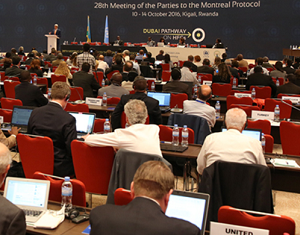The Kigali Amendment to the Montreal Protocol have entered into force from 01.01.2019. Both developed and developing countries have taken on mandatory commitments to reduce the global production and consumption of hydrofluorocarbons (HFCs), harmful man-made greenhouses gases.
The EU has made a promising start. In 2017, HFC consumption in the EU was 12% below its first stepdown agreed under the Kigali Amendment.
This agreement is expected to reduce global warming up to 0.4°C by 2100, which will make a significant contribution to the Paris Agreement objective to limit the temperature rise well below 2°C.
197 Parties to the Montreal Protocol agreed on the Kigali Amendment in October 2016 to gradually reduce global production and consumption of HFCs. Developed countries start in 2019 with a reduction to 90% of the baseline and decreasing in further steps until a 15% level is reached from 2036 onwards. Most developing countries follow in 2024 with a deferred phase-down schedule.
Twenty parties had to ratify the Amendment for its entry into force. This threshold was achieved in November 2017. To date, over one-third of the 63 parties to the Kigali Amendment are Member States of the EU, which itself ratified on 26 September 2018.
The EU is leading the world in taking action on fluorinated gases (F-gases), which are dominated by HFCs. The EU phase-down of F-gases, which goes into its fifth year now, is fully on track. The F-gas Regulation aims to cut the EU’s F-gas emissions by two-thirds by 2030.
11 January 2019
Global HFC phasedown starts – the EU already below its first limit
Related news
Danfoss opens water test lab for tailored nozzle performance valida...
Danfoss has opened a new water test laboratory at its Nordborg production site, offering tailored nozzle performance testing for customers in applications such as humidification, dust suppression, ...
26 Jun 2025
AHRI reports 6.4% rise in April U.S. HVAC shipments
U.S. shipments of central air conditioners and air-source heat pumps increased by 6.4 percent in April 2025, according to the latest data from the Air-Conditioning, Heating, and Refrigeration I...
23 Jun 2025
Daikin invests in Asuene to expand decarbonization services
Daikin Industries, Ltd. has invested in Asuene Inc., a Tokyo-based startup offering CO2 emissions tracking and ESG management services. The investment was made through a third-party allocation of s...
18 Jun 2025
LU-VE Group’s Spirotech plant receives National Export Award in India
LU-VE Group’s Indian subsidiary, Spirotech, has received the National Export Award from the Engineering Export Promotion Council (EEPC), under the Ministry of Commerce, Government of India. The awa...
01 Jul 2025
Caverion Austria acquires Lepuschitz Kältetechnik GmbH
Caverion Austria has acquired Lepuschitz Kältetechnik GmbH, a refrigeration specialist based in Wernberg, Carinthia. The acquired company employs 18 people and generates annual revenue of approxima...
01 Jul 2025
Modine acquires Climate by Design International to expand IAQ offering
Modine has announced the acquisition of Climate by Design International (CDI), a Minnesota-based manufacturer of desiccant dehumidification technology and critical process air handlers. The acquisi...
yesterday
